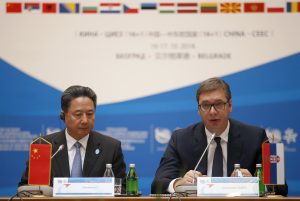On March 16, 2020, Serbian President Aleksandar Vucic reportedly condemned the EU for its response to the COVID-19 coronavirus pandemic, saying “Only China can help us.” Vucic’s remarks were an implicit criticism of the EU and its member states for not responding to Serbia’s request for assistance. For China, keen to restore its international reputation, they were welcome. On March 21, a Chinese medical team arrived in Serbia, prompting Serbian tennis star Novak Djokovic to go to social media to thank China for its help. The post quickly spread across the social media world.
China is now trying to send a message, for both domestic and international audiences, about the legitimacy of its handling of the novel coronavirus, aiming to return to normality and restore its damaged international reputation as it argues that its domestic situation is recovering. Of course, many countries blame China’s initial response to the coronavirus for the global contagion. However, the international community, including developed countries, is not working together to tackle the pandemic; rather, the fight is taking place on a country-by-country basis. For many developed countries, their own domestic situation has top priority, and they can’t afford to provide international assistance. China, by contrast, has offered support to major powers. Consequently, countries in need of assistance, such as Serbia, will look to Beijing. With not only China but also Russia sending help to Italy, we might say that internationalism is being practiced not by OECD countries but rather by those with authoritarian regimes.
In December 2019, Chinese Foreign Minister Wang Yi visited Slovenia and announced that China and 17 Central and Eastern European countries (CEECs) would hold their leadership summit in the first half of 2020, later scheduling it for April. The meeting will likely be postponed, but on March 13, China held an expert videoconference on the prevention and control of infection with the 17 CEECs, in which China’s measures against the coronavirus were presented, and the subsequent promotion of public health cooperation was also suggested.
This framework of China and the 17 CEECs (China-CEEC, 17+1) was launched in Warsaw in 2012 and has been positioned on the front lines of the Belt and Road Initiative (BRI). Since then, a number of countries, including Poland, Czech Republic, and Slovakia, have gradually begun to lose interest in the BRI and have kept their distance from the 17+1 framework, while others have built close ties with China. Hungary is an example of the latter, while Montenegro has implemented infrastructure development with financial support from China.
In considering their relations with China, CEECs pay particular attention to their relationships with Russia and the EU. For Poland, which has a tense security relationship with Russia, one concern is the security cooperation between Russia and China, while Hungary, by contrast, is moving closer to China because of its own tensions with Brussels. One emerging trend, however, the aggressive approach of China and Russia to the non-EU CEECs. Those countries that are EU candidates but not yet members, such as Serbia, Northern Macedonia, Montenegro and Albania, face numerous nation-building challenges. Preoccupied with internal issues such as Brexit, the EU has not been able to provide these countries with sufficient care, enabling China and Russia to increase their involvement. The China-CEEC “17+1” administrative-level meeting took place in Beijing in October 2019 to set the future agenda, but little progress has been made in this framework since the China-CEEC “17+1” leadership summit that was held in April of the same year. This lack of progress is in part a reflection of Europe’s growing sense of vigilance towards China.
However, the novel coronavirus pandemic appears to have offering new opportunities for “17+1.” Some Chinese are calling for Beijing and the CEECs to work together to prevent epidemics under the framework of 17+1, and to make it the cornerstone of BRI. Will the global spread of an infectious disease change the landscape of international cooperation for infectious disease control? If authoritarian countries are more positive about global governance and providing support for developing countries, this will open up the possibility that COVID-19 could play a role in transforming the international order. The consequences of the novel coronavirus will need to be considered in all contexts.
Shin Kawashima is a professor at the University of Tokyo.

































